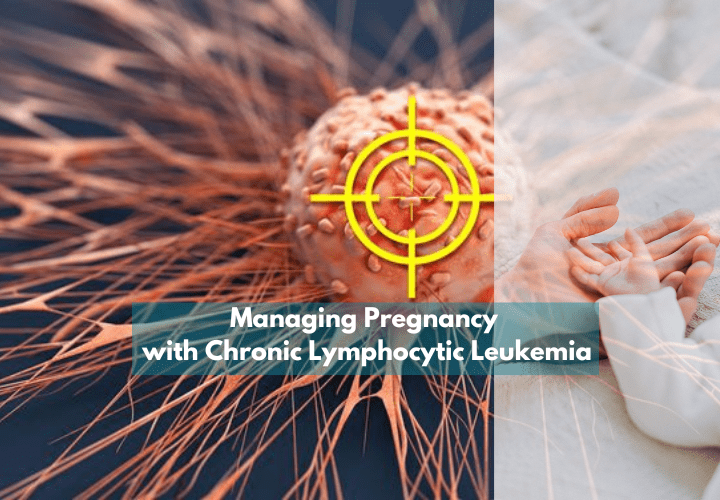Managing Pregnancy with Chronic Lymphocytic Leukemia

Managing Pregnancy with Chronic Lymphocytic Leukemia
- onco
- April 30, 2024
Pregnancy is a transformative and joyous experience for many women, but it can also present unique challenges when managing a chronic condition like Chronic Lymphocytic Leukemia (CLL). CLL is a type of blood cancer characterized by the abnormal proliferation of white blood cells, particularly lymphocytes. While CLL is more commonly diagnosed in older adults, it can also occur in younger individuals, including women of childbearing age. Navigating pregnancy with CLL requires careful consideration, specialized medical care, and close collaboration between healthcare providers to ensure the well-being of both the mother and the developing fetus.
Understanding Chronic Lymphocytic Leukemia (CLL)
CLL is a chronic and slowly progressing cancer that primarily affects the immune system. It is characterized by the accumulation of abnormal lymphocytes in the blood, bone marrow, and lymphatic tissues. The exact cause of CLL is not fully understood, but certain genetic and environmental factors may contribute to its development. Common symptoms of CLL include enlarged lymph nodes, fatigue, recurrent infections, and abnormal bleeding.
Impact of CLL on Pregnancy
Managing CLL during pregnancy poses unique challenges due to the complex interaction between maternal health, cancer progression, and fetal development. The hormonal changes associated with pregnancy can influence the behavior of CLL cells, potentially affecting disease progression. Additionally, the treatment options for CLL must be carefully evaluated to minimize risks to the developing fetus.
Key Considerations for Pregnancy with CLL
- Pre-Pregnancy Counseling: Women diagnosed with CLL who are considering pregnancy should seek pre-conception counseling from a hematologist or oncologist specializing in CLL. This consultation is essential for discussing fertility preservation options, assessing disease activity, and evaluating the potential risks and benefits of pregnancy.
- Disease Monitoring: Regular monitoring of CLL during pregnancy is critical to assess disease progression and detect any complications. Blood tests, imaging studies, and consultations with hematologists will help guide treatment decisions and ensure optimal maternal and fetal outcomes.
- Treatment Decisions: The management of CLL during pregnancy requires a multidisciplinary approach involving oncologists, hematologists, obstetricians, and maternal-fetal medicine specialists. Treatment options such as chemotherapy and targeted therapies may be deferred or modified to minimize fetal exposure while maintaining maternal health.
Managing Pregnancy with CLL: Practical Tips
- Open Communication: Maintain open and honest communication with your healthcare team about your CLL diagnosis and pregnancy plans.
- Prenatal Care: Attend all prenatal appointments and recommended CLL monitoring visits to ensure comprehensive care.
- Lifestyle Modifications: Adopt a healthy lifestyle with balanced nutrition, regular exercise, and adequate rest to support overall well-being during pregnancy.
- Genetic Counseling: Consider genetic counseling to assess the risk of passing CLL to your child and explore family planning options.
Finding the Best Cancer Doctor in Delhi Identifying the best medical care for managing CLL during pregnancy is essential for ensuring optimal outcomes. Here are steps to find top cancer doctors and hospitals in Delhi:
- Research and Recommendations: Seek referrals from trusted sources, including primary care physicians, hematologists, or patient advocacy groups specializing in blood cancers.
- Hospital Reputation: Look for hospitals with a strong reputation for oncology care, including expertise in blood cancer treatment in Delhi and maternity services. Consider factors such as medical expertise, facilities, patient reviews, and success rates.
- Consultation and Second Opinions: Schedule consultations with recommended oncologists to discuss treatment options, pregnancy management, and postpartum care. Don’t hesitate to seek a second opinion to make informed decisions about your care.
Conclusion
Managing pregnancy with Chronic Lymphocytic Leukemia requires careful planning, specialized medical care, and ongoing monitoring. By working closely with a multidisciplinary team of healthcare providers, women with CLL can navigate pregnancy safely while prioritizing their health and the well-being of their baby. It’s essential to stay informed about treatment options, communicate openly with healthcare providers, and seek support from loved ones throughout the journey. With proper management and guidance, women with CLL can have successful pregnancies and healthy outcomes.
Recent Posts
-
Can Testicular Cancer affect fertility?
April 23, 2025
-
Why are Breast Cancer Cases Increasing Around the World?
April 17, 2025





Leave a Reply